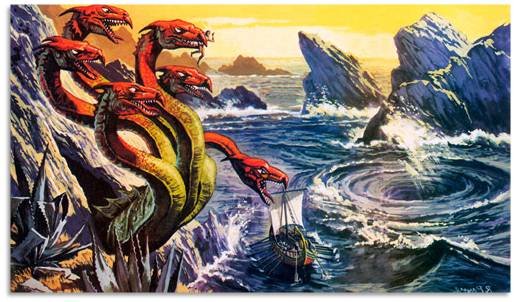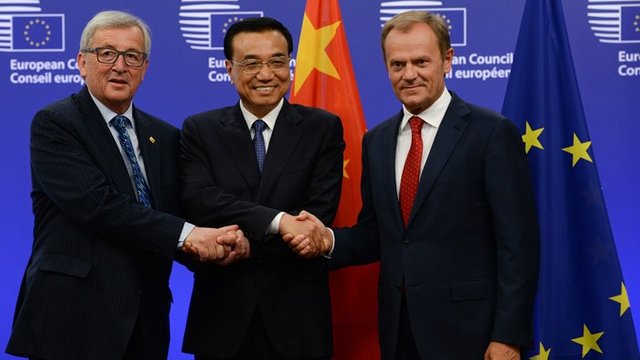Global Economy: Between A Rock And A Hard Place
by James Corbett
corbettreport.com
July 7, 2018
Well, it's official: "Japan Inc." is now "Bank of Japan Inc."
Oh, OK, not officially official, but just about. As the Nikkei Asian Review reports, the Bank of Japan (BOJ) is now a top-10 shareholder in a whopping 40% of the listed companies in the country. That's right, having purchased 25 trillion yen ($227 billion) worth of exchange-traded funds in the past eight years, Japan's central bank is now one of the top 10 shareholders in 1,446 out of 3,735 companies listed on the Tokyo Stock Exchange.
Even the banksters admit they've painted themselves into a corner with their stock buying frenzy. BOJ Governor Kuroda concedes that if the bank persists in pumping its funny money into the markets there will be serious "side effects" that could harm the entire banking sector. So they should turn off the spigot and drain the monetary swamp by raising rates, right? Nope. As BOJ board member Yutaka Harada points out, the banksters can't reverse the tide and raise interest rates because "bond and stock prices would decline and the yen would appreciate," completely negating the entire point of the asset purchases in the first place.
So what does all of this mean?
Well, if you're Japanese it means your central bank is creating (as one Japan-based asset manager puts it) "a new form of financial socialism" from which "Nobody can see a smooth exit strategy."
But more broadly, the economic pickle that Japan finds itself in right now is merely a small-scale example of the dilemma that the global economy is facing. Caught between the low interest global liquidity trap and the high interest global debt trap. Caught between the globalist "free trade" nightmare and the emerging trade war/hot war nightmare. Caught between the expansion of a predatory system that is designed to drain the wealth of the average worker and the collapse of that system, which will assuredly drain the wealth of the average worker.
The straits between these economic rocks and hard places couldn't be any narrower. It's enough to make Scylla and Charybdis look like a cakewalk.
But for those who fail to comprehend the bigger picture here, it should be stressed that this isn't just about interest rates and bond yields. The point here isn't what level the stock market is at or whether some trader in Jeddah is going to be selling oil in dollars or yuan. The real point, as I have been trying to stress in this column for some time, is that economics is never just economics. The global economy rests on a monetary paradigm. That monetary paradigm emerges not from some economic calculation but, more often than not, the barrel of a gun.
It's no coincidence that the Bretton-Woods system instituting the US dollar reserve paradigm arose from the ashes of WWII. It's no coincidence that that paradigm began to break down when the US started using its reserve currency privileges to run up the debt for the military-industrial complex. It's no coincidence that the petrodollar paradigm which replaced Bretton-Woods rested on a military and geopolitical alliance with the Saudis. It's no coincidence that the erosion of that paradigm is giving rise to worries about a Third World War and, presumably, a monetary reset.
It's no coincidence because all of these things are directly related. The breakdown of the economic order is intimately tied to the breakdown of the geopolitical order. It's part and parcel of the change that is occurring in the monetary order. And it is inseparable from the rising military tensions that accompany the decline of the American unipolar order.
Let's highlight another "small" story that fills in one of the pieces of this giant jigsaw puzzle.
Earlier this week, China pitched an idea to EU diplomats attending a Sino-European summit in Beijing: "Join us in an anti-US trade alliance and together we can win the global trade war!" Multiple suggestions were proffered for what form such an alliance might take. China could open up more of its market to EU business as a gesture of good will, for instance, or the two powers could launch a joint action against the US at the World Trade Organization.
The EU's reaction was swift: "Thanks, but no thanks!"
You have to admit, it was a bold gambit. The idea of the EU throwing Uncle Sam (and the almighty dollar) overboard for a few paper promises about "freer trade" from the notoriously mercantilist ChiComs is absurd.
But think about what it means that such an idea was even proposed. A few years ago, even a few months ago, such a plan would have been unthinkable. Today, it is merely fanciful. And tomorrow . . . ?
This is what the breakdown of the global trading order is really about: Not the fluctuations in the trading accounts or currency reserves of this or that nation, but the reorganization of the alliances between those nations. And, if push comes to shove, the possible crossing of swords between nations.
Now couple this story with the BOJ shareholder story (or the Argentinian peso story, or the emerging market bond story, or the Iranian oil story, or any number of other stories from the world of economics, finance and trade) and the picture becomes even clearer: We are heading toward a crisis. The only question is what new order will emerge from that crisis.
As I discussed in my most recent edition of the "Questions For Corbett" series, a period of chaos, breakdown and crisis is necessary for a change in world order to occur. And whether that change leads to the New World Order that the powers-that-shouldn't-be are constantly lusting after or a new flowering of human freedom is still very much up in the air.
In the end, that question will not be answered by the central bankers of the world. It will be answered by us. That answer lies in us withdrawing our support for the current system, choosing where to re-direct our energy and resources, refusing to fight the banksters' wars for them, and creating the alternative system we want to see emerge from the chaos . . . or lying back and doing nothing. And I think we all know where that option leads.



what will they think of next to sustain their ponzi schemes? child loans? sleep tax?
What will they think of
Next to sustain their ponzi
Schemes? child loans? sleep tax?
- uuits
I'm a bot. I detect haiku.
Great haiku man
Well, if you really want to change things, you may want to check out my article "How to Get Rid of the American Deep State."
That's sure what Donald Trump wants everyone to think.
LOVE ME SOME CORBETT. What a fantastic and educational article!
Let me just add that the USA has been doing the exact same thing, except our PTB/banksters here have been doing a slightly better job of keeping the info from the people. The U.S. equity market is also greatly propped up by our Fed and its multiplicity of front companies. The situation isn't quite as bad as in the bond/debt instrument markets where the Fed is the major buyer of our own debt since about 2009, but it's getting close.
In short, both stocks and bonds (along with real estate) are major bubbles dwarfed only by the even-more-secretive derivatives bubble.
When it all bursts, only hard assets (with FOOD as KING) will really benefit. All 401Ks invested in anything but hard assets (non-real estate, that is) will be wiped out.
https://www.cnbc.com/2018/04/06/us-china-trade-battle-could-create-a-new-world-order.html
It goes to show that these systems are not being run by "smart" elites with complex, well though out, "master plans" in place. Instead, the system is being run by plain old people - and not very smart ones. Any idiot can see what they are doing wont work and will end in total failure. However, they literally have all the money in the world so it's easy for them to run the system. Worse case, when things fail terribly, go back to the tax payer and force more money out. If that wont work, start a war. None of their kind will fight or die. No biggie....
When you have no account ability, nothing you do is a mistake. Nothing they do has any consequences for them. They can't make any mistakes because mistakes only exist when there are repercussions for ones actions. They have none, therefore everything they do is right and they will never loose. It's a system of one and it was built that way on purpose. The only way out is to make their system obsolete and move on. Crypto's and distributed internet platforms are a good start.
Yakuza Economics
They can only drool at another tax , but their heads will be falling away from their bodies this time .
The Solution to Free The Planet!
○
https://busy.org/@motherlibertynow/the-solution-to-free-the-planet